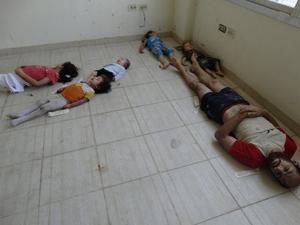SyriaIsrael: Assad used chemical weapons on 27 March in a Damascus neighborhood
President Bashar Assad’s military used chemical weapons two weeks ago in a neighborhood east of Damascus against opposition forces, a senior Israeli defense official said yesterday (Monday). Syrian rebels reported of two instances in which Assad’s forces used chemical weapons recently, both about two weeks ago and both in Damascus neighborhoods, and the Israeli confirmation was the first information provided by outside intelligence sources to back up the rebels’ claims.

Victims of Syrian gas attack being readied for removal // Source: assawsana.com
President Bashar Assad’s military used chemical weapons two weeks ago in a neighborhood east of Damascus against opposition forces, a senior Israeli defense official said yesterday (Monday).
Syrian rebels reported of two instances in which Assad’s forces used chemical weapons recently, both about two weeks ago and both in Damascus neighborhoods. Haaretz reports that the Israeli confirmation was the first information provided by outside intelligence sources to back up the rebels’ claims.
The first attack took place on 27 March, and Haaretz says Israeli sources say Israel has concrete evidence of such use of chemical weapons in the Harsata neighborhood of eastern Damascus. The sources noted that the chemicals used by the Syrian military on 27 March were not lethal, but rather are incapacitating agents typically used to neutralize people for a few of hours. Israeli officials say they cannot confirm the use of chemicals in the second case, which occurred in the same neighborhood.
Israeli defense minister Moshe Ya’alon on Monday said that the Syrian regime has destroyed its entire production line for manufacturing chemical weapons, and it appears to have destroyed most of the ammunition used to deliver the chemical weapons. About 60 percent of the chemical materials have already been taken out of Syria for destruction.
“In recent weeks the process of removing the material from Syria has quickened, after a short break, via a Danish or Norwegian ship n Latakia and from there to an American site where the material will be destroyed,” said Ya’alon.
Ya’alon also said the situation in Syria has reached an impasse. “Today Assad controls a bit less than 40 percent of [Syrian] territory,” he said. Recently Assad has received political support because of the process to destroy the chemical weapons, said Ya’alon.
